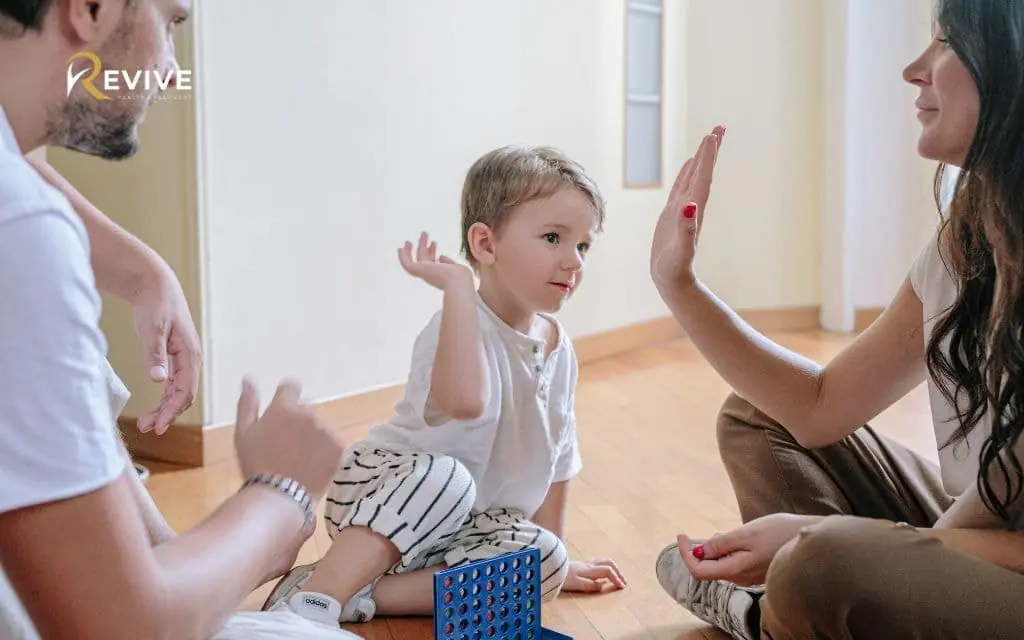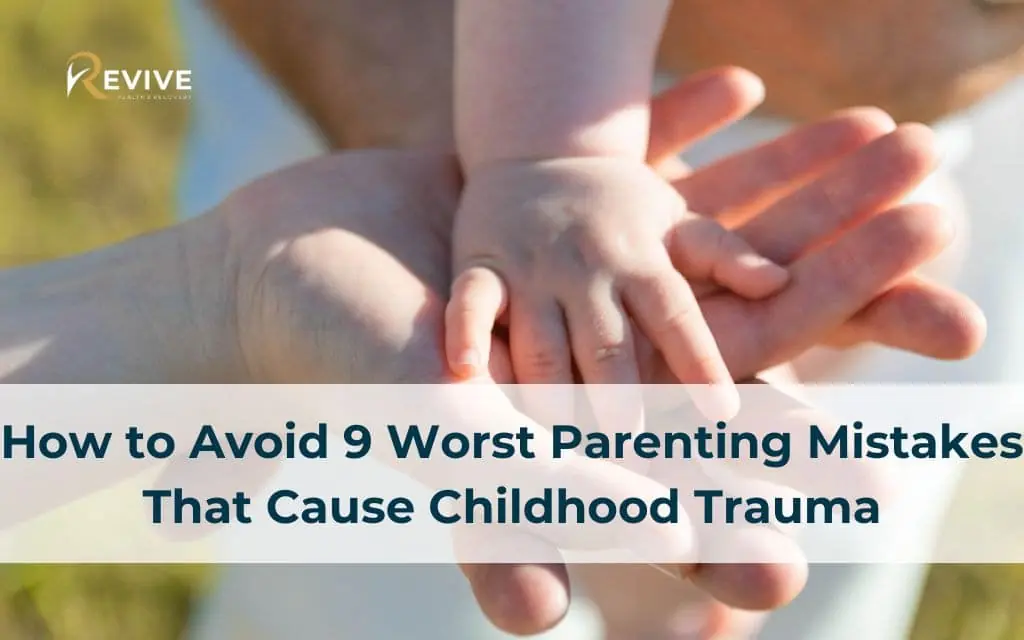Parenting is perhaps the most challenging job in the world, and despite our best intentions, we can sometimes make mistakes that leave lasting impacts on our children. Understanding parenting mistakes that cause childhood trauma is essential for breaking generational cycles and fostering healthier family dynamics. As a trauma specialist at Revive Health Recovery in Colorado, We’ve worked with countless families struggling with the after effects of childhood trauma, and We’re here to share insights that can help parents in Denver and beyond create safer, more nurturing environments for their children.
Understanding Childhood Trauma and Its Impact in Colorado Families
What Defines Childhood Trauma?
Childhood trauma isn’t limited to obvious abuse or neglect. It encompasses any experience that overwhelms a child’s ability to cope, creating a sense of fear, helplessness, or horror. These experiences can fundamentally alter a child’s developing brain, affecting everything from their stress response system to their ability to form healthy relationships later in life.
To understand the root causes, explore what causes childhood trauma in detail.
Trauma responses are as unique as children themselves. Some might become withdrawn and anxious, while others act out aggressively. What’s consistent is that these responses represent adaptations to perceived threats – the child’s best attempt to protect themselves in difficult circumstances.
The Alarming Statistics on Childhood Trauma in Colorado
The statistics on childhood trauma in Colorado paint a concerning picture. According to research, 55% of Colorado children have experienced at least one adverse childhood experience (ACE), and roughly one in nine have experienced three or more ACEs, putting them at particularly high risk for negative outcomes.
Research from the Centers for Disease Control and Prevention has extensively documented how these adverse childhood experiences can impact lifelong health and wellbeing.

In 2019, Colorado’s child abuse rate rose to 9.7 victims per 1,000 children under 18, the highest child maltreatment rate seen in the state. In Denver specifically, the Denver Child Advocacy Center responds to thousands of reports of child abuse annually, highlighting the urgent need for greater awareness and prevention efforts.
How Childhood Trauma Affects Development and Future Relationships
When a child experiences trauma, their developing brain adapts in ways designed for survival rather than thriving. Research from Harvard’s Center on the Developing Child shows this adaptation often takes the form of toxic stress response, which can disrupt healthy brain architecture and affect long-term health.
The consequences can include:
- Disrupted attachment patterns
- Difficulties with emotional regulation
- Impaired cognitive development
- Heightened stress responses
- Increased risk for mental health challenges
- Challenges forming healthy relationships
These effects don’t necessarily end in childhood. Research consistently shows that adverse childhood experiences can lead to long-term health consequences, including higher rates of depression, anxiety, substance abuse, and even chronic physical conditions like heart disease.
The Most Damaging Parenting Mistakes That Cause Lasting Trauma
Emotional Neglect: The Invisible Wound
Emotional neglect is perhaps the most insidious form of childhood trauma because it’s characterized by what doesn’t happen. When parents consistently fail to respond to a child’s emotional needs, validate their feelings, or provide comfort during distress, children internalize the message that their emotions don’t matter.
A Denver parent might work long hours to provide financially while unintentionally creating an emotionally barren home environment. Children in such situations often grow up unable to identify or express their own emotions, leading to difficulties in relationships and self-understanding.
Authoritarian Parenting: When Strict Becomes Harmful
Authoritarian parenting emphasizes obedience and discipline above all else, often employing harsh punishment without explanation. While structure is important, parenting that relies heavily on power and control teaches children that their perspectives and feelings don’t matter, and that love is conditional on perfect behavior.
Children raised under highly authoritarian parents may appear well-behaved on the surface but often struggle with low self-esteem, aggression, or difficulty making independent decisions as adults.

Inconsistent Parenting: The Rollercoaster of Uncertainty
Few parenting approaches are more destabilizing than inconsistent parenting. When rules, consequences, and expressions of love vary wildly from day to day, children never develop a sense of security. One day, a behavior might be met with laughter; the next day, the same behavior triggers rage.
This unpredictability forces children to be constantly vigilant, trying to gauge their parent’s mood and adjust accordingly. The resulting hypervigilance often follows them into adulthood, manifesting as anxiety and difficulty trusting others.
Overprotective Parenting: Undermining Independence
In Colorado’s adventure-loving culture, it might seem counterintuitive, but overprotective parenting can cause significant trauma by preventing children from developing confidence in their own abilities. When parents shield their children from all discomfort, failure, or risk, they inadvertently communicate that the world is dangerous and that the child is incapable of handling challenges.
Research shows that overprotection can lead to anxiety disorders, poor coping skills, and difficulty making decisions independently – all of which can persist into adulthood.
Minimizing Children’s Feelings and Experiences
“Don’t cry,” “You’re fine,” “Stop being so sensitive” – these seemingly innocent phrases can actually invalidate a child’s emotional reality. When parents consistently minimize their children’s feelings, they teach them to doubt their own perceptions and experiences.
Children whose emotions are regularly dismissed learn to suppress their feelings, often developing physical symptoms like headaches or stomachaches as the emotional energy seeks expression in other ways.
Using Shame or Humiliation as Discipline
Discipline that relies on shame or public humiliation may yield immediate compliance, but at a devastating cost to a child’s developing sense of self. Comments like “What’s wrong with you?” or “Why can’t you be more like your sister?” teach children that they are fundamentally flawed.
This type of discipline is particularly harmful because it attacks the child’s core identity rather than addressing specific behaviors. The resulting shame can follow them throughout life, affecting their relationships, career choices, and mental health.
Parentification: When Children Become Caregivers
Parentification occurs when children are forced to take on adult responsibilities, whether caring for younger siblings, managing household duties, or providing emotional support to their parents. While helping out is healthy, expecting children to function as mini-adults robs them of their childhood and places burdens on them that they’re developmentally unprepared to handle.
In Denver’s high-cost housing market, some families might rely on older children for extensive childcare while parents work multiple jobs. While sometimes unavoidable, this situation requires careful attention to ensure children still have appropriate outlets and support.
Failing to Set Appropriate Boundaries
While authoritarian parenting errs on the side of too much control, failing to set any boundaries creates its own form of trauma. Children actually need and want appropriate limits – they provide a sense of security and demonstrate that someone cares enough to keep them safe.
Without boundaries, children can feel adrift and anxious, never knowing where the lines are or what consequences might suddenly appear. This uncertainty can create lasting anxiety and difficulty with self-regulation.
Exposing Children to Conflict and Hostility
Children who regularly witness intense conflict between parents or caregivers experience profound stress, even if the conflict isn’t directed at them. Their developing nervous systems register the hostility as a threat, triggering fight-or-flight responses that, when repeatedly activated, can lead to lasting changes in brain development and stress response systems.
This doesn’t mean parents should never disagree, but rather that heated arguments, name-calling, and threats have no place in front of children.
Recognizing the Signs of Childhood Trauma in Denver Children
Behavioral Indicators of Trauma
Recognizing the signs of childhood trauma is critical for early intervention. The National Child Traumatic Stress Network provides comprehensive resources to help identify trauma responses in children of different ages. Children often communicate distress through behavior rather than words. Signs that might indicate trauma include:
- Regression to earlier behaviors (bedwetting, baby talk)
- Extreme compliance or defiance
- Difficulty concentrating or sitting still
- Hypervigilance (constantly on alert)
- Sleep disturbances or nightmares
- Frequent physical complaints without medical cause
If you notice these patterns in your child, or if you’re an educator or healthcare provider observing them in children you work with, they warrant further attention.
Emotional Signs That Shouldn’t Be Ignored
Trauma responses often surface as emotional changes. Watch for:
- Excessive worry
- Persistent sadness
- Numbing or detachment
- Extreme mood swings
- Intense fears
- Loss of interest in previously enjoyed activities
Children experiencing trauma may struggle to verbalize their feelings, so these emotional indicators are important signals that something deeper might be happening.
Physical Manifestations of Psychological Trauma
Trauma doesn’t just affect the mind – it profoundly impacts the body as well. Physical signs of trauma can include:
- Chronic headaches or stomachaches
- Altered eating patterns
- Startling easily
- Physical flinching when approached
- Changes in energy level (either hyperactivity or lethargy)
- Frequent illnesses due to compromised immune function
These physical symptoms often emerge when emotional distress has no other outlet, turning psychological pain into bodily discomfort.
Academic and Social Impact of Childhood Trauma
The effects of trauma frequently spill into a child’s school performance and social relationships. Warning signs include:
- Sudden changes in academic performance
- Difficulty making or keeping friends
- Social withdrawal
- Inappropriate boundaries with others
- School avoidance
- Problems with authority figures
Teachers in Denver schools often notice these changes first and can be valuable partners in identifying children who might need additional support.
Breaking the Cycle: Trauma-Informed Parenting Approaches
Understanding Your Own Childhood Experiences
Breaking the cycle of trauma requires understanding trauma-informed approaches to parenting that can help create healthier family dynamics.
One of the most powerful steps in preventing parenting mistakes that cause childhood trauma is examining your own upbringing. We often parent the way we were parented unless we consciously choose a different path.
Ask yourself:
- What aspects of my childhood felt nurturing and safe?
- What experiences were hurtful or damaging?
- How do I react when my child’s behavior triggers my own painful memories?
This self-awareness creates space to respond thoughtfully rather than reactively to your child’s needs.
Learn practical strategies to avoid childhood trauma in your parenting approach.
Creating Emotional Safety Through Consistency
Children thrive on predictability. Consistent routines, clear expectations, and reliable responses help children feel secure, even when facing life’s inevitable challenges.
This doesn’t mean rigidity – rather, it means cultivating an environment where children know what to expect and can count on their caregivers to respond with reasonable consistency to similar situations.
Effective Communication Strategies That Prevent Trauma
How we talk to children shapes their internal dialogue for years to come. Trauma-informed parenting emphasizes:
- Validating feelings before addressing behaviors
- Using “I” statements rather than accusations
- Explaining the “why” behind rules and limits
- Listening to understand rather than to respond
- Apologizing when we make mistakes
These communication patterns teach children that they are worthy of respect and that their perspectives matter.
Setting Healthy Boundaries Without Authoritarianism
Boundaries are essential for children’s development, but they don’t have to be rigid or punitive. Healthy boundaries:
- Are clearly communicated
- Have consistent, reasonable consequences
- Focus on teaching rather than punishing
- Consider the child’s developmental stage
- Prioritize relationship over perfect compliance
When children understand the purpose behind limits and feel their autonomy is respected within those limits, they’re more likely to internalize the values behind the rules.
Building Resilience in Colorado Children
Colorado families face unique challenges, from economic pressures to the physical isolation that can come with mountain living. Building resilience in this context means:
- Fostering strong community connections
- Teaching adaptive coping skills
- Encouraging age-appropriate independence
- Celebrating efforts rather than just outcomes
- Modeling healthy stress management
Resilient children are better equipped to navigate life’s inevitable challenges without experiencing them as traumatic.
Denver Resources for Parents and Children Healing from Trauma
Professional Support Options in the Denver Metro Area
Denver offers numerous professional resources for families affected by childhood trauma:
- Trauma-focused cognitive behavioral therapy (TF-CBT) is widely available through organizations like the Denver Child Advocacy Center.
- Family therapy with trauma-specialized therapists can help heal relational patterns.
- Child-parent psychotherapy specifically addresses trauma within the parent-child relationship.
At Revive Health Recovery, we offer comprehensive trauma treatment with therapists specifically trained in childhood trauma recovery. Our team understands the unique dynamics of Colorado families and provides culturally responsive care.

Colorado-Specific Programs for Trauma-Informed Parenting
Colorado has developed innovative programs to support families in preventing and healing from trauma through state-funded initiatives and resources:
- The Colorado Child Welfare Training System offers trauma-informed parenting classes throughout the state.
- Parentline Colorado provides free telebehavioral health services for pregnant and postpartum parents experiencing emotional challenges.
- Children’s Hospital Colorado offers specialized trauma programs and parenting support.
Support Groups and Community Resources
Sometimes, the most valuable support comes from others who understand your journey. Denver offers several support options:
- Parents Thrive Colorado hosts peer support groups for parents working through their own trauma to break generational cycles.
- Family Resource Network offers trauma-informed parenting workshops throughout the Denver metro area.
- The Trauma Survivors Network at Denver Health provides community and resources for those healing from various forms of trauma.
How Revive Health Recovery Helps Families Heal from Trauma
At Revive Health Recovery, we understand that healing from trauma is a family journey. Our comprehensive approach includes:
- Individual therapy for both parents and children
- Family therapy to address relational patterns
- Parenting support and education
- Trauma-specific treatment modalities
- Holistic approaches addressing mind, body, and spirit
We believe that with the right support, families can not only heal from trauma but grow stronger through the process. If you’re concerned about how past parenting mistakes might be affecting your family, or if you’re working to overcome your own childhood trauma, we’re here to help. Contact us at (303) 351-7695 to learn more about our trauma healing programs.
Healing Journey: Recovering from Childhood Trauma as an Adult
Recognizing the Effects of Childhood Trauma in Adulthood
Many adults don’t realize that their current struggles may be rooted in childhood experiences. Signs that childhood trauma might be affecting your adult life include:
- Relationship patterns that feel familiar but unhealthy
- Difficulty trusting others or maintaining boundaries
- Strong emotional reactions that seem disproportionate
- Persistent negative beliefs about yourself
- Challenges with emotional regulation
Recognizing these patterns is the first step toward healing from emotional neglect and other childhood traumas.
Therapeutic Approaches for Adult Survivors
Denver offers several evidence-based approaches for adults healing from childhood trauma:
- EMDR (Eye Movement Desensitization and Reprocessing) helps process traumatic memories
- Somatic therapies address trauma stored in the body
- Internal Family Systems work helps heal different parts of the self affected by trauma
- Cognitive Processing Therapy addresses distorted thoughts resulting from trauma
At Revive Health Recovery, we tailor treatment approaches to each individual’s specific needs and experiences, recognizing that trauma healing isn’t one-size-fits-all.
Self-Care Practices for Trauma Recovery
Beyond professional treatment, self-care plays a crucial role in trauma recovery:
- Mindfulness practices help ground you in the present rather than the traumatic past
- Movement therapies like yoga can help release trauma stored in the body
- Creative expression provides outlets for emotions that might be difficult to verbalize
- Nature connection, readily available in Colorado’s beautiful outdoors, can be deeply healing for the traumatized nervous system
Breaking Generational Patterns of Traumatic Parenting
Perhaps the most powerful aspect of healing from childhood trauma is the opportunity to break generational cycles. By doing your own healing work, you create the possibility of different experiences for your children and future generations.
This doesn’t require perfect parenting – rather, it means being willing to acknowledge mistakes, repair ruptures in the relationship, and continually grow in your capacity to provide the nurturing presence your children need.
FAQs About Parenting Mistakes That Cause Childhood Trauma
If I experienced childhood trauma, am I likely to repeat the same mistakes with my children?
While unresolved childhood trauma can increase the risk of repeating patterns, awareness and healing work can powerfully interrupt this cycle. Revive Health Recovery offers specialized treatment for adults healing from their own childhood trauma while parenting, providing the support needed to create different experiences for your children.
Can a child recover from trauma caused by parenting mistakes?
Absolutely. Children have remarkable capacity for healing when provided with consistent, responsive care and appropriate support. Revive Health Recovery specializes in evidence-based treatment approaches that help children process traumatic experiences and develop healthier patterns. The earlier intervention occurs, the better the outcomes typically are.
Are there specific resources in Denver for parents who want to practice trauma-informed parenting?
Yes, Denver offers excellent resources for trauma-informed parenting, including workshops through the Denver Child Advocacy Center, parent coaching through Parents Thrive Colorado, and specialized therapy at Revive Health Recovery. As the leading trauma recovery center in Denver, Revive Health Recovery provides comprehensive support for parents wanting to develop more nurturing, responsive parenting approaches.
How can I tell if my parenting style is causing trauma to my child?
Signs that your parenting style might be causing distress include your child showing persistent anxiety, withdrawal, aggression, sleep disturbances, or regression in behavior. If you’re concerned, Revive Health Recovery offers parenting assessments and supportive, non-judgmental guidance to help you develop more trauma-informed approaches.
What is the most common parenting mistake that cause trauma in Colorado families?
Emotional neglect is one of the most common parenting mistakes that cause trauma in Colorado families. The fast-paced lifestyle and high cost of living in areas like Denver can sometimes lead parents to be physically present but emotionally disconnected. Revive Health Recovery offers specialized programs to help parents develop stronger emotional connections with their children and heal from their own experiences of neglect.
Conclusion
Understanding parenting mistakes that cause childhood trauma is not about assigning blame but about creating awareness that empowers change. Every parent makes mistakes – what matters most is our willingness to recognize those moments, repair the relationship, and continuously grow in our capacity to provide the nurturing, consistent presence our children need.
If you recognize patterns in your own parenting that concern you, or if you’re working to heal from trauma in your childhood, know that support is available. At Revive Health Recovery, we specialize in trauma healing for Colorado families, with specific expertise in the unique challenges faced by Denver residents.
Breaking cycles of trauma is courageous work, and it’s not meant to be done alone. Contact Revive Health Recovery at (303) 351-7695 to learn more about our trauma therapy programs and parenting support services. Together, we can create healthier patterns for the next generation.



